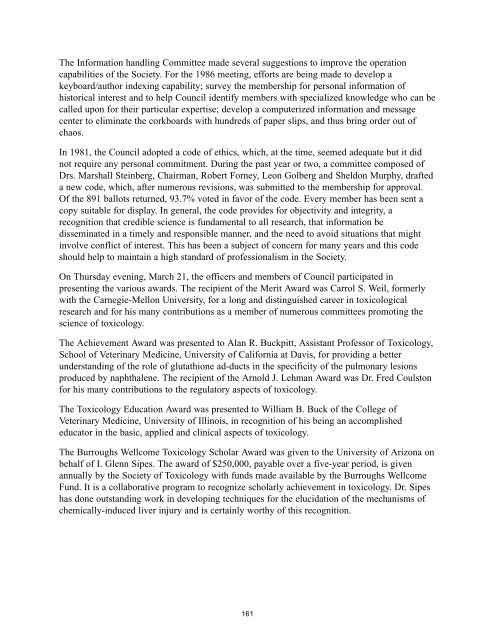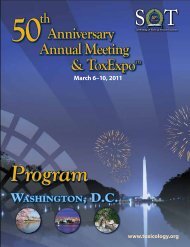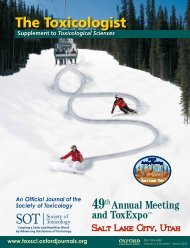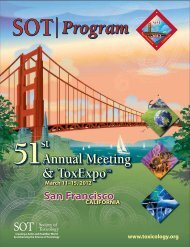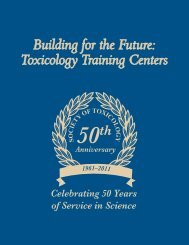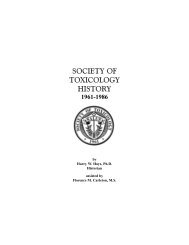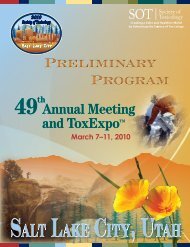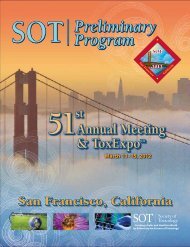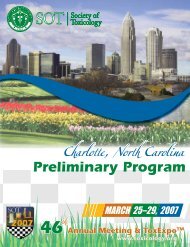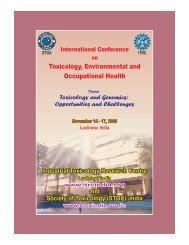SOCIETY O. TOXICOLOGY HISTORY - Society of Toxicology
SOCIETY O. TOXICOLOGY HISTORY - Society of Toxicology
SOCIETY O. TOXICOLOGY HISTORY - Society of Toxicology
You also want an ePaper? Increase the reach of your titles
YUMPU automatically turns print PDFs into web optimized ePapers that Google loves.
The Information handling Committee made several suggestions to improve the operation<br />
capabilities <strong>of</strong> the <strong>Society</strong>. For the 1986 meeting, efforts are being made to develop a<br />
keyboard/author indexing capability; survey the membership for personal information <strong>of</strong><br />
historical interest and to help Council identify members with specialized knowledge who can be<br />
called upon for their particular expertise; develop a computerized information and message<br />
center to eliminate the corkboards with hundreds <strong>of</strong> paper slips, and thus bring order out <strong>of</strong><br />
chaos.<br />
In 1981, the Council adopted a code <strong>of</strong> ethics, which, at the time, seemed adequate but it did<br />
not require any personal commitment. During the past year or two, a committee composed <strong>of</strong><br />
Drs. Marshall Steinberg, Chairman, Robert Forney, Leon Golberg and Sheldon Murphy, drafted<br />
a new code, which, after numerous revisions, was submitted to the membership for approval.<br />
Of the 891 ballots returned, 93.7% voted in favor <strong>of</strong> the code. Every member has been sent a<br />
copy suitable for display. In general, the code provides for objectivity and integrity, a<br />
recognition that credible science is fundamental to all research, that information be<br />
disseminated in a timely and responsible manner, and the need to avoid situations that might<br />
involve conflict <strong>of</strong> interest. This has been a subject <strong>of</strong> concern for many years and this code<br />
should help to maintain a high standard <strong>of</strong> pr<strong>of</strong>essionalism in the <strong>Society</strong>.<br />
On Thursday evening, March 21, the <strong>of</strong>ficers and members <strong>of</strong> Council participated in<br />
presenting the various awards. The recipient <strong>of</strong> the Merit Award was Carrol S. Weil, formerly<br />
with the Carnegie-Mellon University, for a long and distinguished career in toxicological<br />
research and for his many contributions as a member <strong>of</strong> numerous committees promoting the<br />
science <strong>of</strong> toxicology.<br />
The Achievement Award was presented to Alan R. Buckpitt, Assistant Pr<strong>of</strong>essor <strong>of</strong> <strong>Toxicology</strong>,<br />
School <strong>of</strong> Veterinary Medicine, University <strong>of</strong> California at Davis, for providing a better<br />
understanding <strong>of</strong> the role <strong>of</strong> glutathione ad-ducts in the specificity <strong>of</strong> the pulmonary lesions<br />
produced by naphthalene. The recipient <strong>of</strong> the Arnold J. Lehman Award was Dr. Fred Coulston<br />
for his many contributions to the regulatory aspects <strong>of</strong> toxicology.<br />
The <strong>Toxicology</strong> Education Award was presented to William B. Buck <strong>of</strong> the College <strong>of</strong><br />
Veterinary Medicine, University <strong>of</strong> Illinois, in recognition <strong>of</strong> his being an accomplished<br />
educator in the basic, applied and clinical aspects <strong>of</strong> toxicology.<br />
The Burroughs Wellcome <strong>Toxicology</strong> Scholar Award was given to the University <strong>of</strong> Arizona on<br />
behalf <strong>of</strong> I. Glenn Sipes. The award <strong>of</strong> $250,000, payable over a five-year period, is given<br />
annually by the <strong>Society</strong> <strong>of</strong> <strong>Toxicology</strong> with funds made available by the Burroughs Wellcome<br />
Fund. It is a collaborative program to recognize scholarly achievement in toxicology. Dr. Sipes<br />
has done outstanding work in developing techniques for the elucidation <strong>of</strong> the mechanisms <strong>of</strong><br />
chemically-induced liver injury and is certainly worthy <strong>of</strong> this recognition.<br />
161


